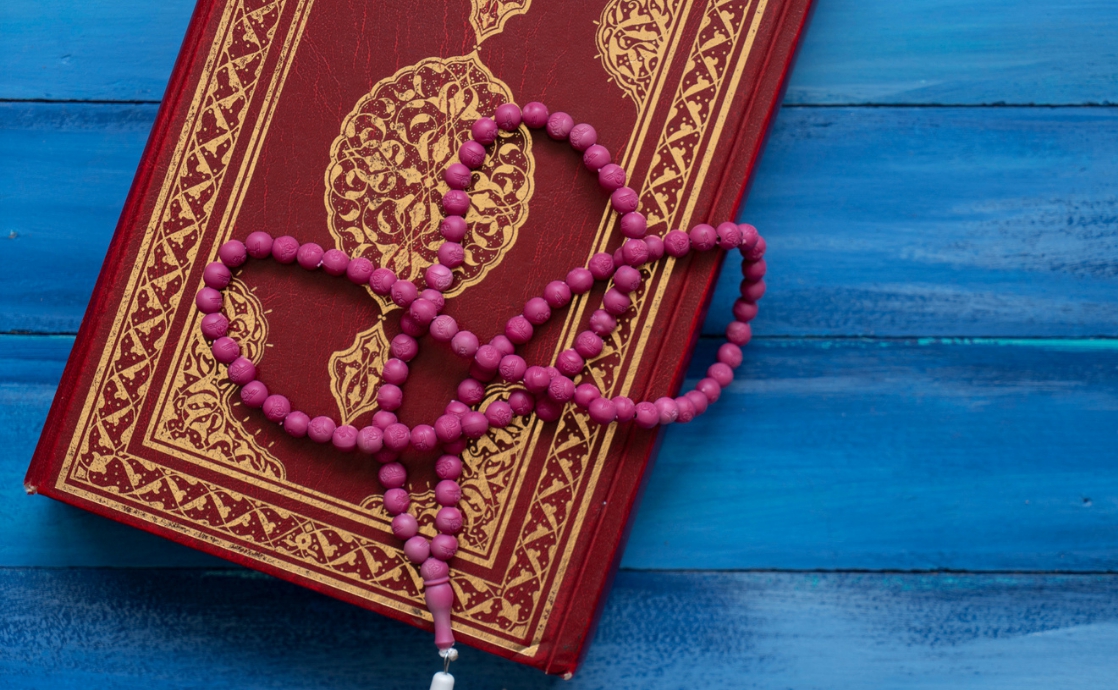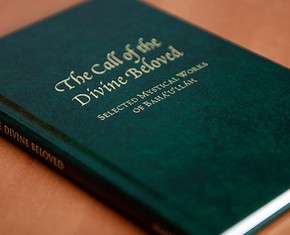The views expressed in our content reflect individual perspectives and do not represent the authoritative views of the Baha'i Faith.
By Christopher Buck and Dergham Aqiqi
In this interview Baha’i author and scholar Chris Buck talks with Dergham Aqiqi, a well-known Baha’i student of the Qur’an and its meanings, about the implications of the phrase “seal of the prophets.”
Q: Dergham, in a recent Zoom presentation by Baha’i scholar, Todd Lawson, we got reacquainted, after having first met years ago in Ottawa, Canada. We talked about how Shoghi Effendi — the Guardian of the Baha’i Faith, who led the worldwide Baha’i community from 1921 to 1957 — gave us the gift of not only his inspired translations of the Baha’i sacred scriptures, but also gave us the gift of equally inspired interpretations of the original Persian and/or Arabic texts, especially where there may be some ambiguities or other difficulties in the meaning of certain of these original texts.
Since then I’ve learned that you have a special interest in Qur’anic studies, Islam, and how the Baha’i scriptures explain and interpret the Qur’an, the holy book of Islam.
RELATED: Baha’u’llah’s Book of Certitude: Illuminating Spiritual Wisdom
So Dergham, would you please explain to our readers why do you agree with this reading — Qur’an, 33:40 as the “former verse” and Qur’an 33:44 as the “latter” verse to which Baha’u’llah alludes — and give us your own explanation in support of this discovery — and why, in our interfaith dialogues with our Muslim friends and acquaintances, we should invite them to read Qur’an 33:40 and Qur’an 33:44 together?
A: Sure, Chris. Let’s consider this famous verse: “Muhammad is not the father of any of your men; but he is the Messenger of God, and the Seal of the Prophets. God is Cognizant of everything.” (Qur’an 33:40.)
I am a native speaker of Arabic, and have lived and worked in the Middle East for many years, including in Saudi Arabia, where I lived in the holiest Islamic city of Mecca for a period of time. In my experience, the above verse is the number one argument offered by Muslims in defense of the point that Muhammad is the last prophet — hence, they say, the Baha’i Faith is not valid.
The issue of translating the Baha’i writings into English has occupied my mind for a very long time. For example, when translating references made by the Bab or Baha’u’llah in their “Tablets,” a term for various Baha’i scriptures and letters, the precise meaning may not be clear to the person reading in English unless they are familiar with Islamic cultures.
For instance, when reading a few expressions referring to mystical topics in Baha’u’llah’s last major work, the Epistle to the Son of the Wolf, someone who is not aware of Islamic mystical issues may just read the sentences and pass them by without realizing the full meaning of the statements themselves. That’s why footnotes are necessary for translations. Therefore, the addition of the word “verse” by the Guardian, Shoghi Effendi, succinctly clarified the relationship between Q. 33:40, the “Seal of the Prophets” verse, to the Q. 33:44, the very next “attainment unto the divine Presence” verse. Let me explain.
Note that in the first verse, the term “Seal,” a translation of the Arabic noun khātam, is all-important. But also note that in the second verse, the term “Presence,” a translation of the Arabic verbal noun liqā’, which literally means “meeting,” is equally important. The two go together, and should not be considered separately.
When we decode this prophetic language, we recognize that the terms “Seal” and “Presence” are prophetic symbols. The term “Seal,” of course, refers to the prophet Muhammad (may peace be upon him, as Muslims piously say after mentioning his name).
Correspondingly, Baha’is understand that the term “Presence” refers to the future appearance of the Bab as the next prophet – and, by implication, the divine “Presence” also refers to the future appearance of Baha’u’llah as the prophet whom the Bab would herald.
It might be difficult, even for Persian or Arabic-speaking people, to realize the relationship mentioned in Baha’u’llah’s first passage on this issue:
How strange! These people with one hand cling to those verses of the Qur’án and those traditions of the people of certitude which they have found to accord with their inclinations and interests, and with the other reject those which are contrary to their selfish desires. “Believe ye then part of the Book, and deny part?” (Qur’an 2:85). How could ye judge that which ye understand not? Even as the Lord of being hath in His unerring Book, after speaking of the “Seal” in His exalted utterance: “Muḥammad is the Apostle of God and the Seal of the Prophets,” [Q. 33:40] hath revealed unto all people the promise of “attainment unto the divine Presence.” To this attainment to the presence of the immortal King testify the verses of the Book, some of which We have already mentioned. The one true God is My witness! Nothing more exalted or more explicit than “attainment unto the divine Presence” hath been revealed in the Qur’án. Well is it with him that hath attained thereunto, in the day wherein most of the people, even as ye witness, have turned away therefrom.
Now, let’s ponder Baha’u’llah’s immediate explanation in the following paragraph:
And yet, through the mystery of the former verse, they have turned away from the grace promised by the latter, despite the fact that “attainment unto the divine Presence” in the “Day of Resurrection” is explicitly stated in the Book. It hath been demonstrated and definitely established, through clear evidences, that by “Resurrection” is meant the rise of the Manifestation of God to proclaim His Cause, and by “attainment unto the divine Presence” is meant attainment unto the presence of His Beauty in the person of His Manifestation. For verily, “No vision taketh in Him, but He taketh in all vision. (Q. 6:103)
We find three or four Qur’anic verses in these two paragraphs. But we do not find the full text of the “latter” verse, Q. 33:44. Here is where some “Islamic literacy,” meaning a good familiarity with the Qur’an itself, would be expected on the part of Baha’u’llah’s immediate audience, who, after all, were Babis particularly and Muslims generally. In fact, Baha’u’llah did not quote the full “Seal of the Prophets” verse of Qur’an 33:40, and simply alluded to the “meeting God/attainment unto the divine Presence” verse at Qur’an 33:44. Baha’u’llah’s audience would be expected to recognize this latter, next reference.
Speaking for myself, Baha’u’llah’s reference to Qur’an 33:44 as the “latter” verse is perfectly obvious to me, as a native speaker of Arabic, with a good familiarity with the Arabic text of the Qur’an as a whole. So, by Shoghi Effendi’s adding the word “verse” — which is a skillful “idiomatic” translation from the source language of Persian/Arabic into the target language of English, and also a masterful interpretation of this passage as well — the two issues can be considered in light of these pair of interrelated verses, in close textual proximity to each other. One wonders why the text of Q. 33:44 was not included in the final text!
Perhaps this explanation will help. We know from Baha’i history that Baha’u’llah revealed The Book of Certitude in January, 1861, quite rapidly in the space of two days and two nights. Imagine writing an entire book in that short period of time! So it makes perfect sense that a number of references to the Qur’an would be indicated by clear allusions rather than by explicit citations. In other words, throughout the text, references to the Qur’an are both explicit and implicit. Here, Baha’u’llah’s reference to Qur’an 33:40 was explicit, albeit partial, whereas his reference to Qur’an 33:44 was implicit – an allusion, or by shorthand, as it were.
RELATED: Unveiling 2 Critical Mysteries: Son of God, Seal of the Prophets
We can appreciate that there are many such instances in both Baha’i and Islamic writings where the reader is expected to understand the ins-and-outs of the sequence of the texts. We can say, then, that Baha’u’llah assumed some Qur’anic literacy on the part of his readers, such that this allusion to Quran 33:44, which is the first liqá’ verse that comes after Quran 33:40, would be understood by at least some of his readers.
Back to the issue of translations by Shoghi Effendi, who was the designated and authoritative interpreter of the Baha’i writings. Adding the word “verse” is not just another word inserted in the text, but rather a major clarification to connect the two parts of this single statement: “… through the mystery of the former verse, they have turned away from the grace promised by the latter ….”
The core problem of explaining verses of the holy Qur’an is that some who have attempted to do so would consider each verse of the Qur’an independently of the rest of the other verses, as if each verse is an independent factor. Many interrelated verses are found in various Surahs (chapters of the Qur’an). So it becomes necessary for everyone who wants to obtain an integrated Qur’anic vision of a subject to note the interaction and correlation between its disparate parts. Hence, one of the hadiths (Islamic traditions) states: “They set parts of God’s Book [the Qur’an] against others, whereas God’s Book was sent down only to be consistent; so do not use parts to falsify others.”
When we take these verses of the Qur’an as a whole, the Baha’i teachings assert, we can clearly see that the Qur’an did not use the phrase “the Seal of the Prophets” to claim finality for Muhammad.

















Comments
Sign in or create an account
Continue with Googleor